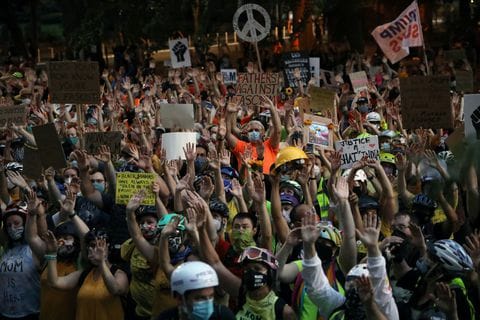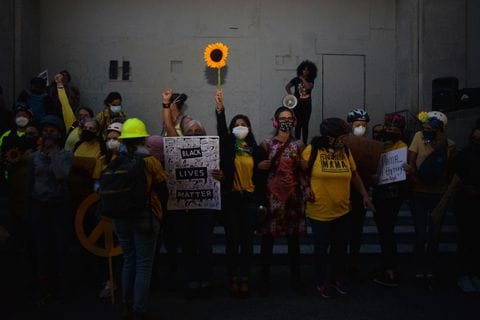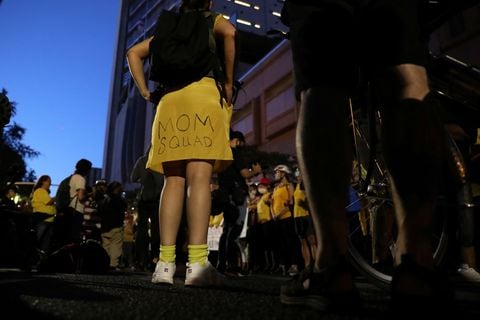In Portland, the spotlight on the wall of Moms underscored the constant presence of the white ally — for better or worse
The wall of moms lined the tumultuous streets of Portland, Ore., placing their bodies, clad in bright yellow shirts, between fellow protesters and law enforcement. The women stood arm in arm, shoulder to shoulder, wearing armor reflective of their privileged lives: scuba masks, shiny bike helmets and White skin.
The allies had arrived.
To be an ally is to step in to a fight that is ostensibly not your own. These maternal allies stood beside Black protesters in their demand for racial justice and police reform. The use of the word isn’t new, of course, and has long been applied to the idea that those who are not directly affected by prejudice can and should join in the march against it. The civil rights activists found support among Jewish citizens. Black Americans lent their might to South Africa’s anti-apartheid movement. Another cadre of moms supported the push for gay rights: PFLAG was born in 1973 as an acronym of Parents and Friends of Lesbians and Gays.
I’m an African American woman. I teeter between relief that this latest outcry for racial justice has so many White allies and frustration that those White faces are necessary. I’m simultaneously filled with despair and hope, anger and gratitude. It’s easy to be a bundle of contradictions in a country filled with good people whose decency is at low tide.
Some aggrieved fellow citizens have said that they suffered one Black president and so it’s only fair that the country now make peace with its 44th White one, even if he espouses racist dogma. In the midst of a pandemic that has savaged Black Americans, throngs of gun-toting, self-declared patriots refuse to wear face masks. Their selfishly misguided definition of liberty becomes just another cog in the systemic racism that left minority communities vulnerable in the first place. Those men and women whose duty is to protect and serve instead bear arms — and tear gas and rubber bullets — to silence free speech on police reform.
Equality should be everyone’s battle. No one is just passing through. No one is excused or untouched. So there shouldn’t be a special title for those who understand that racial justice is fundamental to being human. (But there most definitely should be a term for those who don’t.)
The wall of moms’ intent is unanimity, but calling them allies marks them as separate. Like a tickle in the back of the throat, there’s something bothersome about the word. The moms have been described as placing their bodies between federal officers and activists — as if the mothers themselves are not engaged in the protests, as if each subsequent row of people behind them is not one shield after another. Layers of human bodies in service to our democracy.
The mothers are a show of force, solidarity and empathy. George Floyd, a Black man, had cried out for his mama as he lay dying under the knee of a White police officer on a Minneapolis street one fateful day in May. Floyd was one of the seemingly endless unarmed Black men and women killed by law enforcement. But his death, captured in excruciating video, set off protests calling for police reform and racial justice around the globe. As the weeks passed, the protests grew and transformed. Predictably, the Trump administration conflated peaceful protesters with rogue agitators, recasting the demand to confront the nation’s history honestly and to write its painful truth as anarchical vengeance.
And so Portland’s wall of mothers came, followed by dads wielding leaf blowers that they used to turn back the tide of tear gas fired off by law enforcement. They came for George Floyd because he had cried out. They came for Black Americans. They came for America. They came draped in vibrant yellow and carrying placards that made it clear they were many mothers speaking with a single voice. They wanted observers to see them and remember them. So they orchestrated a camera-ready picture because this is a country of visual learners.
The Black protesters need allies. But it’s also possible to hate that need, the pitying sound of it, the way it overshadows Black achievement and agency, courage and eloquence.
Surely there were already mothers in the mix. What makes these mothers different is they have so obviously claimed the title in their attire, and also in their Whiteness. As they moved en masse, the sight of them tugged on all the emotional chords connected to motherhood, from our confidence in their infinite capacity to love to our belief in the ferocity of their protective instinct. They repeated one of the chants of longtime activists, but to the melody of a gentle lullaby: “Hands up. Please don’t shoot me.” They added that word: Please. They transformed a demand that was steeped in anger and defiance into a childlike plea for what is a birthright: the freedom to live without fear. The syrupy sweetness of their refrain was infantilizing, practically caustic to Black adult autonomy.
All of these allies — the moms and dads — were identified by personal history. They came as a group, but they also came as individuals, as people with a thumbnail identity. They were something more, something different. They were a protected class because they were White. But even if that fact were never mentioned, it would be assumed. Their Whiteness was just the starting point to their self-created identities that added extra height to the pedestal of respectability and influence on which they were born. Their Whiteness is a light that illuminates what has always been present.
The White mothers recognized this. They knew that their light can be blinding, so on their website the original organizers announced that they had relinquished control of their nascent national movement to their Black counterparts. They vowed to take a non-leadership role. Can you simultaneously be the light while retreating to the shadows?
Blackness is a starting point to a life, as well. Too often, it’s also the end point.

 TOP: Mothers and fathers amid protesters during a demonstration in Portland in July. (Caitlin Ochs/Reuters) ABOVE: Mothers form a human chain during a protest in front of the Multnomah County Justice Center in Portland. (Ankur Dholakia/AFP/Getty Images)
TOP: Mothers and fathers amid protesters during a demonstration in Portland in July. (Caitlin Ochs/Reuters) ABOVE: Mothers form a human chain during a protest in front of the Multnomah County Justice Center in Portland. (Ankur Dholakia/AFP/Getty Images) The Black protesters need allies. But it’s also possible to hate that need, the pitying sound of it, the way it overshadows Black achievement and agency, courage and eloquence. History shows us, though, the powerful will typically listen only to those of equal or greater influence. White people. The powerful will ignore, delay, condescend, deflect and lie. They will bury necessary change in bureaucracy, false equivalencies and distractions. Allies who speak the language of executive suite greed and Capitol Hill pollsters can ignite a sense of urgency — or at least make plain the dangerous repercussions for stalling.
The Black Lives Matter movement has innumerable allies. Yes, there are the social media posts, corporate statements and political proclamations that are the public relations version of allyship. But one of the most striking aspects of the photographs of protesters from around the world is how multihued they are. It’s tempting to argue that this rainbow of millennial activists reflects a generation of young adults who are more open-minded and embracing of those who don’t look like them. They have, after all, come of age during a period when Black entertainment culture has, in effect, become popular culture. They exist in a world made borderless thanks to the Internet.
As a group, however, millennials harbor almost as much anti-black prejudice and unconscious bias as their Gen X older siblings and their baby boomer parents. It was the baby boomers who had the most significant shift in mind-set from the preceding generation. Millennials aren’t less racist; they just have grander, more clever language to describe themselves — they are woke; they understand intersectionality — along with the bullhorn of social media to amplify every good intention and minute advancement in their self-awareness. All their followers can see the copy of Robin DiAngelo’s “White Fragility,” a book about why White people struggle to discuss race, on their bedside table. They can see the selfie taken on Washington’s Black Lives Matter Plaza. Social media is powerful and narcissistic; social media is a place to organize and to boast.
Be a proud ally, yes. But must it be all over your Instagram?
 Mothers dressed in yellow. (Caitlin Ochs/Reuters)
Mothers dressed in yellow. (Caitlin Ochs/Reuters) Why would anyone want to take on that mantle anyway? There are so many ground rules for allyship that the list reads like a series of impossible tasks. Do not make yourself the center of the conversation, but embark on deep personal analysis to understand how you’ve benefited from systemic racism. Make it your goal to understand the issues important to members of marginalized communities, but do not badger folks in those communities with your questions. Recognize that you will make mistakes on the road to self-awareness, and own those mistakes, but also know that some mistakes will be unforgivable.
An ally isn’t more capable or experienced or exceptional, but simply recognizes that we’re like Venn diagrams with overlapping commonalities.
Being an ally is different from being a mentor or a champion or a supporter. A mentor offers up knowledge and guidance to those less versed in a particular field. A champion sees your unique talent and helps propel you into the spotlight. A supporter is there when you falter. An ally? An ally isn’t more capable or experienced or exceptional. An ally simply recognizes that we’re like Venn diagrams with overlapping commonalities. An ally is just another human being muddling through life, trying to be decent. Giving them a title is a bit like awarding them a gold sticker just for seeing the humanity in their neighbor.
This modest, bland word feels inadequate to the breadth and complexity of what it means. It’s a burdensome yoke that presumes a desire to be identified and acknowledged. To be self-congratulatory when all most people want is to be helpful.
In Portland, veterans followed the mothers out onto the turbulent streets. Teachers and chefs, lawyers and nurses came, too. Whole communities of individuals arrived until eventually the occupations and backstories stopped mattering. Instead of lines of demarcation separating activists and allies, it was a pointillist image: thousands of individuals holding firm in defense of what’s right and trying to shift the tide.
It was an inspiring visual story. But you had to get frustratingly close to get a good look at the Black innocents, Black citizens and Black mothers and fathers who etched out its beginnings and who formed its foundation. And who’ve always been there — on the front lines, demonstrating their unconditional love and their unyielding desire to protect their children, even if that meant doing so in memoriam.
Robin Givhan is a staff writer for The Washington Post.
Photo editing by Dudley M. Brooks. Design by Michael Johnson.






